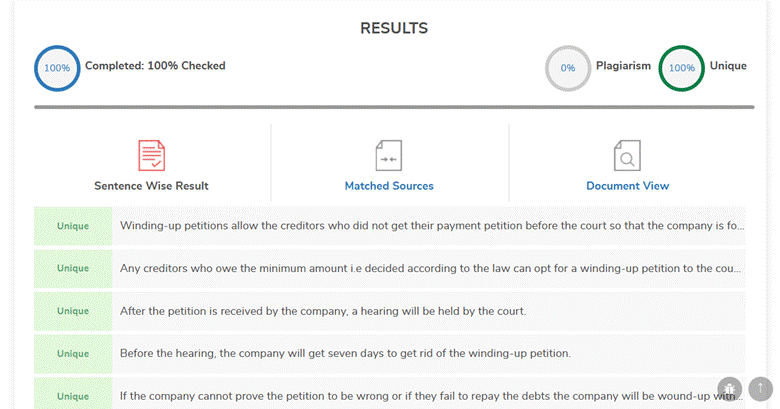How can a company avoid a winding-up petition?
Companies / SME Dec 13, 2020 - 06:37 PM GMTBy: Sumeet_Manhas
Winding-up petitions allow the creditors who did not get their payment before the court so that the company is forced for a closure. Any creditors who owe the minimum amount i.e decided according to the law can opt for a winding-up petition to the courts.
After the petition is received by the company, a hearing will be held by the court. Before the hearing, the company will get seven days to get rid of the winding-up petition. If the company cannot prove the petition to be wrong or if they fail to repay the debts the company will be wound-up with an official notice. The winding-up order will be issued by the court and the official receiver will be appointed to liquidate the company.

Ways to avoid the petition
This is a petition that is filed by a creditor in the court with the aim of forcing the company to close down which means compulsory liquidation. A creditor must owe the maximum amount so that a winding-up petition can be issued against the company. The most simple way to avoid the winding-up petition is to make sure that the company is free from all loans from all the creditors.
The time must be maintained to pay off the debts and in full amount. Unfortunately, if there is a tough time for the company or if the company is insolvent paying the money timely is not possible. The best thing at that time one needs to do is to have a talk with the creditors and also try to make an agreement so that how and when the company will be able to repay the outstanding amount.
In case the company is insolvent, the directors of the company will consider taking and implementing actions to rescue the company. This process of rescuing is known as CVA or Company Voluntary Arrangements. Or else the company can also enter into administration.
Negotiating with the creditors
As a first step, the company must try to negotiate with the directors so that an agreement is made between the company and the directors. The agreement must state how the company will repay the dues and when. If the money is owed by HMRC, the company will get adequate time to negotiate a Time to Pay Agreement, where the company can pay the dues over the period of time agreed by both sides. On behalf of the company negotiation just be with other creditors also.
CVA or Company Voluntary Arrangement
Company voluntary arrangement or CVA is a formal process that makes an agreement between the unpaid creditors and the company. A company that cannot pay its debts gets a chance to repay the loans over an agreed time.
If CVA is implemented, the creditors must need the agreement of at least 75% of the creditors of the company. The creditors must explain that turning out the company can help them to achieve their money that is unpaid.

Administration
Opting for administration will rescue the company that is unpaid. One administrator is appointed by the company to manage the administration. This will help to restore the profitability of the company. In the administration, a moratorium is placed which means the creditors become unable to take any sort of legal actions or even issue the winding-up petitions. It is considered as one of the powerful tools to prevent the company from facing the winding-up petition.
Creditor’s voluntary liquidation
One of the statutory processes is the creditor’s voluntary liquidation. It helps to prevent the liquidation of the unpaid amount of the company. In such a case the company’s shareholders and directors together come to a conclusion to close the company and also appoint a liquidator to go on the closure procedure. The director opts for compulsory liquidation to get more control of the process.
Take help from agency and lawyers
Companies can opt for help from expert agencies and lawyers to take a proper step during the first seven days of the petition being issued. The first seven days are extremely vital for the company. It is the time that is given to the company to take proper and prompt action and also prove themselves to be innocent in the court. The lawyers and the agency can also help to prove that the debts are disputed before the petition is issued.
The bottom line
Once the company is unable to pay off the debts, proper action must be taken and implemented so that the company cannot be wound-up. There are proper actions mentioned in the content so that the company can decide which action will be benefited for them.
Every company is different therefore proper action must be taken so that it helps to avoid the wounding-up of the company. Avoiding the winding-up petition can help the company to get rid of any legal hassles.

By Sumeet Manhas
© 2020 Copyright Sumeet Manhas - All Rights Reserved
Disclaimer: The above is a matter of opinion provided for general information purposes only and is not intended as investment advice. Information and analysis above are derived from sources and utilising methods believed to be reliable, but we cannot accept responsibility for any losses you may incur as a result of this analysis. Individuals should consult with their personal financial advisors.
© 2005-2022 http://www.MarketOracle.co.uk - The Market Oracle is a FREE Daily Financial Markets Analysis & Forecasting online publication.



